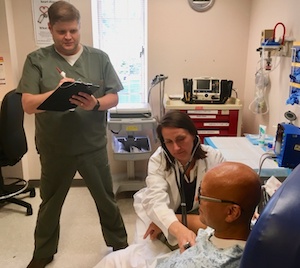What is cardiac MRI?
An MRI is an image or picture that is created using a combination of a magnetic field, radio waves, and computers. Some advantages of MRI over other imaging techniques include no x-rays or radioactive materials are used, and the IV dye/contrast agent is not harmful to the kidneys. Our cardiologists use MRI to create detailed pictures of cardiovascular structures inside the body.
At the Duke Cardiovascular Magnetic Resonance Center, we use MRI to specifically examine the heart and blood vessels throughout the body. Depending on the test your physician has ordered, we will obtain information about the anatomy and function of the heart, and any damage that the heart may have sustained. We also can examine blood flow to the kidneys, legs, and head if your physician requests such an exam.
What should you expect during your examination?

The MRI makes loud noises during the exam while it is taking pictures. You will wear a headset to protect your hearing during the exam. We also use the headset to communicate with you throughout the exam. Many of the images taken during the exam require you to hold your breath for about 10 seconds, and the technologist will be in continual communication with you. You will have to hold still for the entire exam to get clear pictures, however you will be able to move your legs and hands. If you physician has ordered pictures that require contrast agent/dye an IV catheter will be inserted into your arm by a nurse. If your physician has ordered a stress test, two IVs will be inserted and an EKG will be performed. A typical exam takes 60 – 90 minutes, depending on which tests your physician has ordered.
Preparing for your exam
- Do not consume any caffeinated, de-caffeinated, or tobacco products for 24-hours prior to your exam, including chocolate, coffee, soda, or cola. These items will have an adverse effect on your exam. You may have a light meal, water, and juice prior to your exam.
- Please bring a list of all your medications with you. You may take your medicines as usual, however we recommend you delay taking any fluid medicines until you have completed your exam. If you wear a medication patch, please call us for instructions.
- Please bring a list of all surgeries or procedures. If you have any implantable medical devices, please bring the implant card with you.
- If you become anxious in enclosed places and require sedation, you will need to bring a responsible adult with you. If you receive sedation, you will not be able to drive or make decisions for the remainder of the day.
- Please leave jewelry and hair items at home. You will be asked to remove all metal objects such as hearing aids, metal dentures, and glasses prior to your MRI exam. A locked cabinet is provided for your convenience.
We ask that you arrive no later than your requested check-in time. Your early arrival will help ensure that we can perform your test efficiently and safely.